【英语】高三英语情态动词专项训练及答案及解析
- 格式:doc
- 大小:75.50 KB
- 文档页数:15
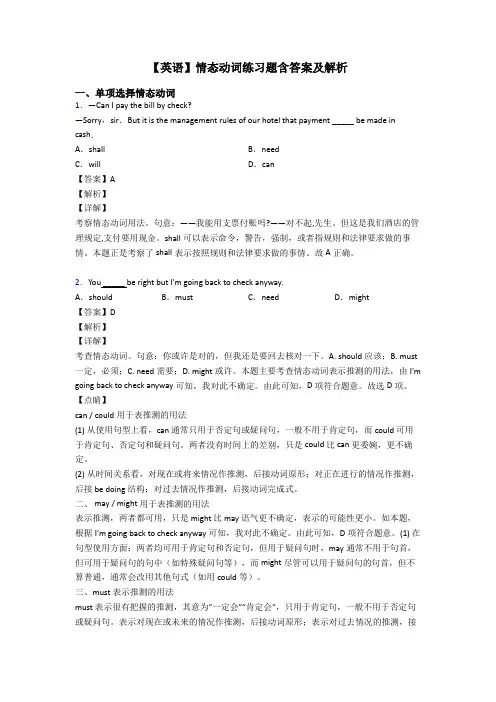
【英语】情态动词练习题含答案及解析一、单项选择情态动词1.—Can I pay the bill by check?—Sorry,sir.But it is the management rules of our hotel that payment _____ be made in cash.A.shall B.needC.will D.can【答案】A【解析】【详解】考察情态动词用法。
句意:——我能用支票付账吗?——对不起,先生。
但这是我们酒店的管理规定,支付要用现金。
shall可以表示命令,警告,强制,或者指规则和法律要求做的事情。
本题正是考察了shall表示按照规则和法律要求做的事情。
故A正确。
2.You _____ be right but I’m going back to check anyway.A.should B.must C.need D.might【答案】D【解析】【详解】考查情态动词。
句意:你或许是对的,但我还是要回去核对一下。
A. should应该;B. must 一定,必须;C. need需要;D. might或许。
本题主要考查情态动词表示推测的用法,由I’m going back to check anyway可知,我对此不确定。
由此可知,D项符合题意。
故选D项。
【点睛】can / could用于表推测的用法(1) 从使用句型上看,can 通常只用于否定句或疑问句,一般不用于肯定句,而could 可用于肯定句、否定句和疑问句。
两者没有时间上的差别,只是could 比 can 更委婉,更不确定。
(2) 从时间关系看,对现在或将来情况作推测,后接动词原形;对正在进行的情况作推测,后接 be doing 结构;对过去情况作推测,后接动词完成式。
二、 may / might用于表推测的用法表示推测,两者都可用,只是 might 比 may 语气更不确定,表示的可能性更小。
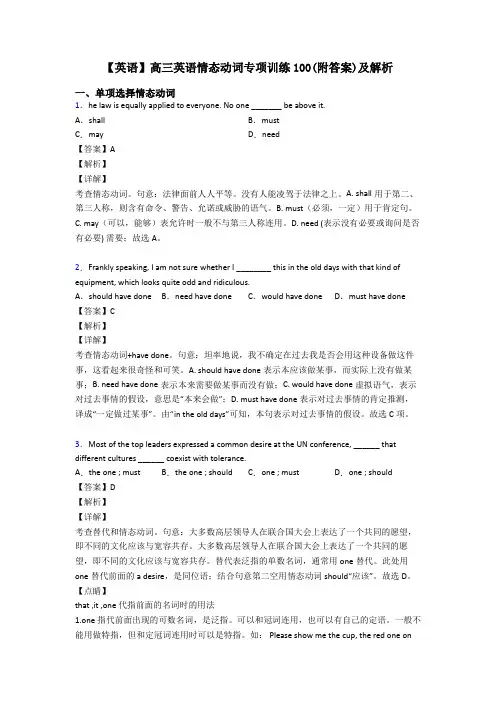
【英语】高三英语情态动词专项训练100(附答案)及解析一、单项选择情态动词1.he law is equally applied to everyone. No one _______ be above it.A.shall B.mustC.may D.need【答案】A【解析】【详解】考查情态动词。
句意:法律面前人人平等。
没有人能凌驾于法律之上。
A. shall用于第二、第三人称,则含有命令、警告、允诺或威胁的语气。
B. must(必须,一定)用于肯定句。
C. may(可以,能够)表允许时一般不与第三人称连用。
D. need (表示没有必要或询问是否有必要) 需要;故选A。
2.Frankly speaking, I am not sure whether I ________ this in the old days with that kind of equipment, which looks quite odd and ridiculous.A.should have done B.need have done C.would have done D.must have done 【答案】C【解析】【详解】考查情态动词+have done。
句意:坦率地说,我不确定在过去我是否会用这种设备做这件事,这看起来很奇怪和可笑。
A. should have done表示本应该做某事,而实际上没有做某事;B. need have done表示本来需要做某事而没有做;C. would have done虚拟语气,表示对过去事情的假设,意思是“本来会做”;D. must have done表示对过去事情的肯定推测,译成“一定做过某事”。
由“in the old days”可知,本句表示对过去事情的假设。
故选C项。
3.Most of the top leaders expressed a common desire at the UN conference, ______ that different cultures ______ coexist with tolerance.A.the one ; must B.the one ; should C.one ; must D.one ; should【答案】D【解析】【详解】考查替代和情态动词。
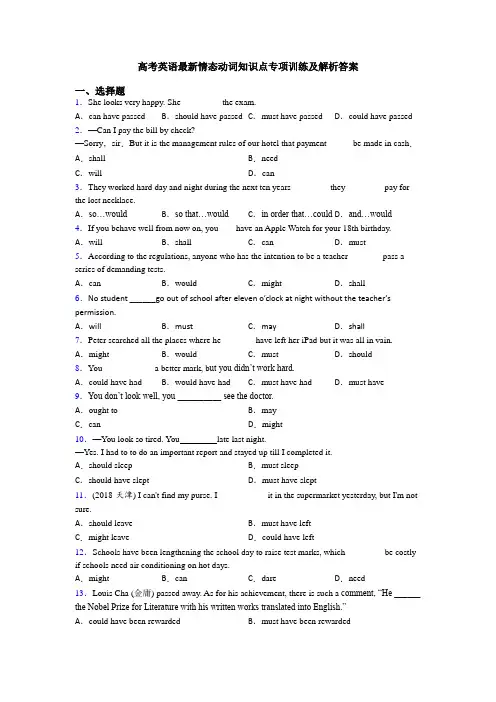
高考英语最新情态动词知识点专项训练及解析答案一、选择题1.She looks very happy. She_________ the exam.A.can have passed B.should have passed C.must have passed D.could have passed 2.—Can I pay the bill by check?—Sorry,sir.But it is the management rules of our hotel that payment _____ be made in cash.A.shall B.needC.will D.can3.They worked hard day and night during the next ten years ________ they ________ pay for the lost necklace.A.so…would B.so that…would C.in order that…could D.and…would4.If you behave well from now on, you ___ have an Apple Watch for your 18th birthday. A.will B.shall C.can D.must 5.According to the regulations, anyone who has the intention to be a teacher _______ pass a series of demanding tests.A.can B.would C.might D.shall6.No student ______go out of school after eleven o’clock at night without the teacher’s permission.A.will B.must C.may D.shall7.Peter searched all the places where he________have left her iPad but it was all in vain. A.might B.would C.must D.should8.You ___________ a better mark, b ut you didn’t work hard.A.could have had B.would have had C.must have had D.must have9.You don’t look well, you __________ see the doctor.A.ought to B.mayC.can D.might10.—You look so tired. You________ late last night.—Yes. I had to to do an important report and stayed up till I completed it.A.should sleep B.must sleepC.should have slept D.must have slept11.(2018·天津) I can't find my purse. I___________ it in the supermarket yesterday, but I'm not sure.A.should leave B.must have leftC.might leave D.could have left12.Schools have been lengthening the school day to raise test marks, which ________ be costly if schools need air conditioning on hot days.A.might B.can C.dare D.need13.Louis Cha (金庸) passed away. As for his achievement, there is such a comment, “He ______ the Nobel Prize for Literature with his written works translated into English.”A.could have been rewarded B.must have been rewardedC.should be rewarded D.need have been rewarded14.He did not regret saying what he did but felt that he _________ it differently.A.could express B.would expressC.could have expressed D.must have expressed15.One of our rules is that every student _______ wear school uniform while at school. A.might B.couldC.shall D.will16.The lady ________ have done something wrong, because she is looking guilty.A.would B.should C.can D.must17.We lost our way in that small village, otherwise we ________more places of interest yesterday.A.visited B.had visitedC.would visit D.would have visited18.There’s no light on --- they _______ be at home.A.can’t B.mustn’t C.needn’t D.wouldn’t 19.Word that you _________ enjoy a three-day holiday has come if you do complete the task on time.A.may B.should C.could D.shall20.—Do you know where Tony is?—He _________ in the living room. I saw him there just now.A.shall be B.should have been C.might have been D.must be 21.—Sorry, Mum! I failed the job interview again.—Oh, it's too bad. You________ have made full preparations.A.must B.can C.would D.should22.It was so noisy that we hear ourselves speak.A.couldn’t B.shouldn’tC.mustn’t D.needn’t23.The heavy rain may ______ the landslide last night.A.accounts for B.accounted forC.have accounted for D.accounting for24.—May I smoke here?—If you _______, choose a seat in the smoking section.A.must B.should C.may D.can25.I still remember my happy childhood when my mother ___________ take me to Disneyland at weekends.A.might B.mustC.would D.should【参考答案】***试卷处理标记,请不要删除一、选择题1.C解析:C【解析】【分析】【详解】考查情态动词。
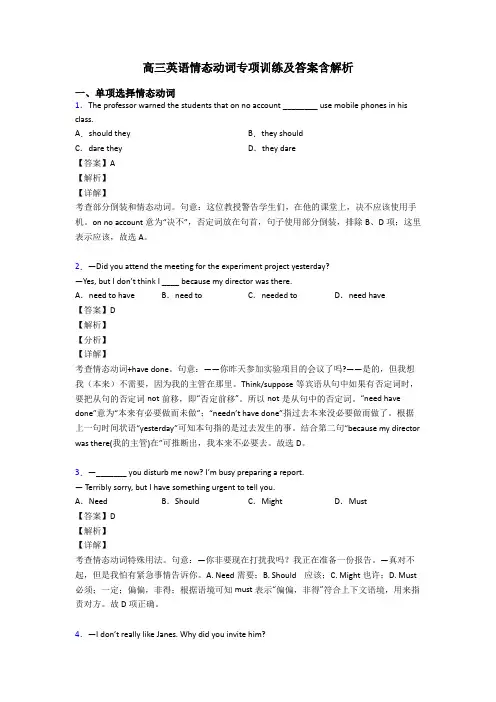
高三英语情态动词专项训练及答案含解析一、单项选择情态动词1.The professor warned the students that on no account ________ use mobile phones in his class.A.should they B.they shouldC.dare they D.they dare【答案】A【解析】【详解】考查部分倒装和情态动词。
句意:这位教授警告学生们,在他的课堂上,决不应该使用手机。
on no account意为“决不”,否定词放在句首,句子使用部分倒装,排除B、D项;这里表示应该,故选A。
2.—Did you attend the meeting for the experiment project yesterday?—Yes, but I don’t think I ____ because my director was there.A.need to have B.need to C.needed to D.need have【答案】D【解析】【分析】【详解】考查情态动词+have done。
句意:——你昨天参加实验项目的会议了吗?——是的,但我想我(本来)不需要,因为我的主管在那里。
Think/suppose等宾语从句中如果有否定词时,要把从句的否定词not前移,即“否定前移”。
所以not是从句中的否定词。
“need have done”意为“本来有必要做而未做”;“needn’t have done”指过去本来没必要做而做了。
根据上一句时间状语“yesterday”可知本句指的是过去发生的事。
结合第二句“because my director was there(我的主管)在”可推断出,我本来不必要去。
故选D。
3.—_______ you disturb me now? I’m busy preparing a report.— Terribly sorry, but I have something urgent to tell you.A.Need B.Should C.Might D.Must【答案】D【解析】【详解】考查情态动词特殊用法。
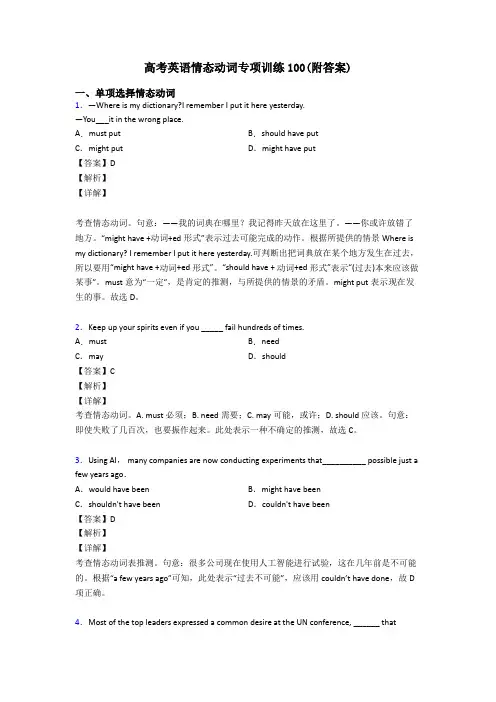
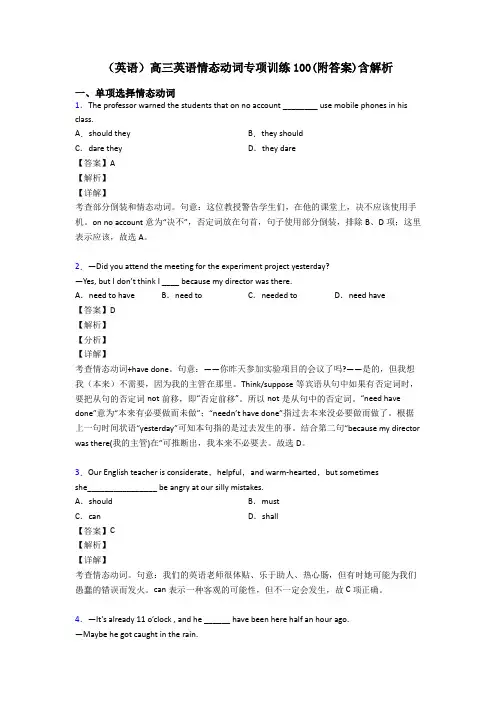
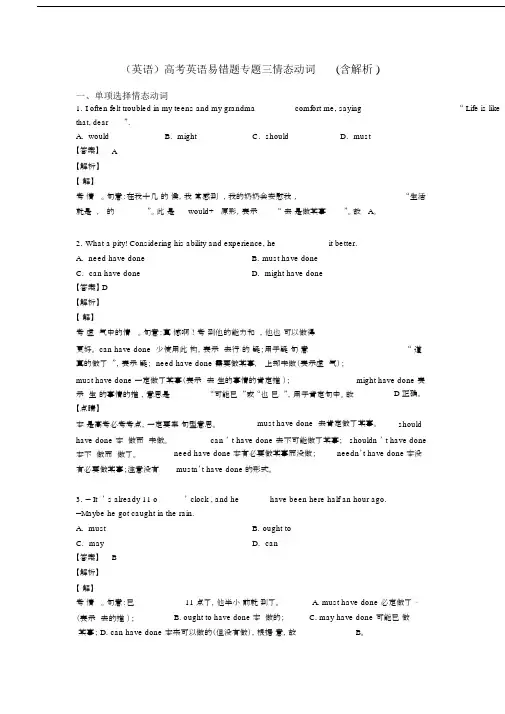
(英语)高考英语易错题专题三情态动词(含解析 )一、单项选择情态动词1.I often felt troubled in my teens and my grandma ________ comfort me, saying“ Life is like that, dear”.A. would B. might C. should D. must【答案】A【解析】【解】考情。
句意:在我十几的候,我常感到,我的奶奶会安慰我,“生活就是,的”。
此是would+ 原形,表示“ 去是做某事”。
故A。
2.What a pity! Considering his ability and experience, he ___________ it better.A. need have done B.must have doneC. can have done D. might have done【答案】 D【解析】【解】考虚气中的情。
句意:真憾啊!考到他的能力和,他也可以做得更好。
can have done 少使用此构,表示去行的疑;用于疑句意“ 道真的做了”,表示疑; need have done 需要做某事,上却未做(表示虚气);must have done 一定做了某事(表示去生的事情的肯定推);might have done 表示生的事情的推,意思是“可能已”或“也已”,用于肯定句中。
故 D 正确。
【点睛】本是高考必考考点,一定要牢句型意思。
must have done 去肯定做了某事。
shouldhave done 本做而未做。
can ’ t have done去不可能做了某事; shouldn ’ t have done本不做而做了。
need have done 本有必要做某事而没做;needn’t have done本没有必要做某事;注意没有mustn’t have done的形式。
3.— It ’ s already 11 o’ clock , and he ______ have been here half an hour ago.—Maybe he got caught in the rain.A. must C. may B.ought to D. can【答案】B 【解析】【解】考情。
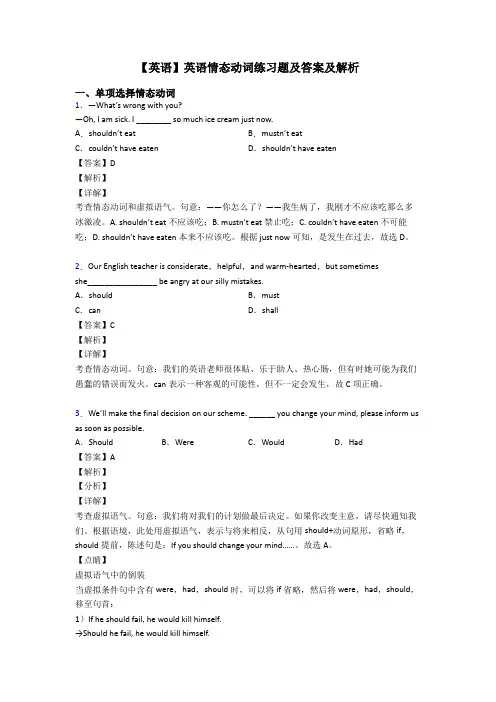
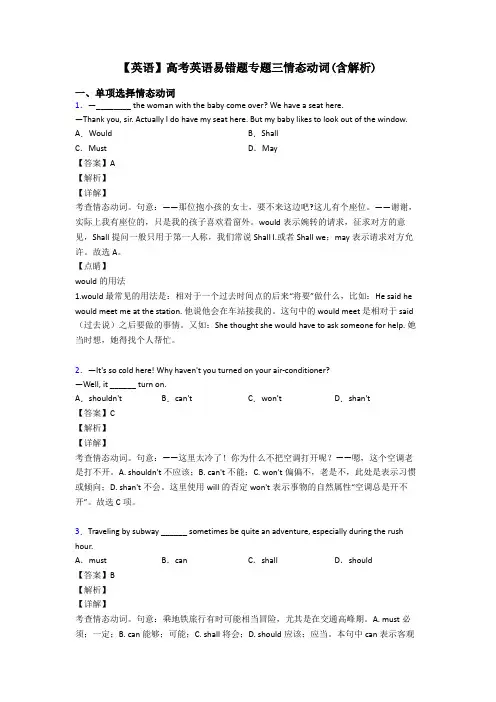
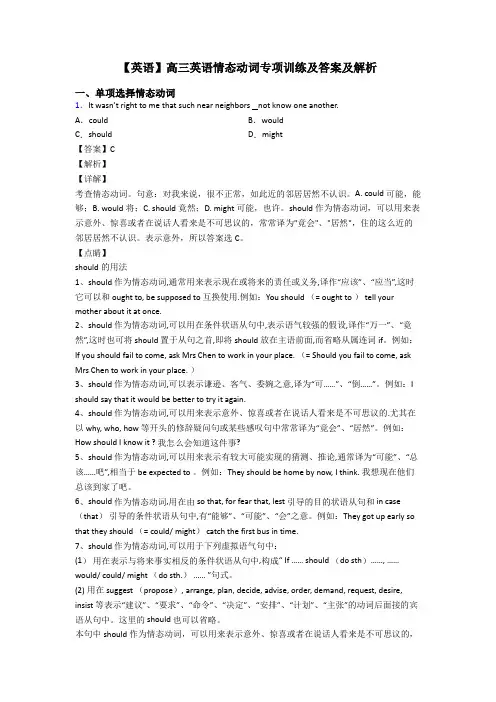
【英语】高三英语情态动词专项训练及答案及解析一、单项选择情态动词1.It wasn’t right to me that such near neighbors not know one another.A.could B.wouldC.should D.might【答案】C【解析】【详解】考查情态动词。
句意:对我来说,很不正常,如此近的邻居居然不认识。
A. could可能,能够;B. would将;C. should竟然;D. might可能,也许。
should 作为情态动词,可以用来表示意外、惊喜或者在说话人看来是不可思议的,常常译为"竟会"、"居然",住的这么近的邻居居然不认识。
表示意外,所以答案选C。
【点睛】should的用法1、should 作为情态动词,通常用来表示现在或将来的责任或义务,译作“应该”、“应当”,这时它可以和 ought to, be supposed to 互换使用.例如:You should (= ought to ) tell your mother about it at once.2、should 作为情态动词,可以用在条件状语从句中,表示语气较强的假设,译作“万一”、“竟然”,这时也可将 should 置于从句之首,即将 should 放在主语前面,而省略从属连词 if。
例如:If you should fail to come, ask Mrs Chen to work in your place. (= Should you fail to come, ask Mrs Chen to work in your place. )3、should 作为情态动词,可以表示谦逊、客气、委婉之意,译为“可……”、“倒……”。
例如:I should say that it would be better to try it again.4、should 作为情态动词,可以用来表示意外、惊喜或者在说话人看来是不可思议的.尤其在以 why, who, how 等开头的修辞疑问句或某些感叹句中常常译为“竟会”、“居然”。
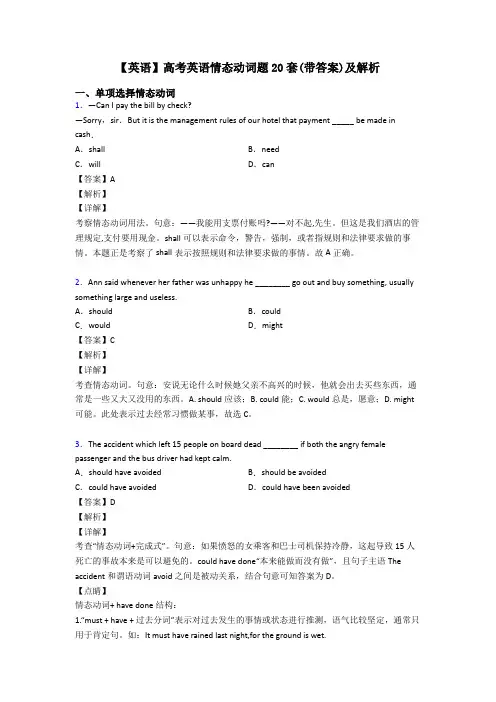
【英语】高考英语情态动词题20套(带答案)及解析一、单项选择情态动词1.—Can I pay the bill by check?—Sorry,sir.But it is the management rules of our hotel that payment _____ be made in cash.A.shall B.needC.will D.can【答案】A【解析】【详解】考察情态动词用法。
句意:——我能用支票付账吗?——对不起,先生。
但这是我们酒店的管理规定,支付要用现金。
shall可以表示命令,警告,强制,或者指规则和法律要求做的事情。
本题正是考察了shall表示按照规则和法律要求做的事情。
故A正确。
2.Ann said whenever her father was unhappy he ________ go out and buy something, usually something large and useless.A.should B.couldC.would D.might【答案】C【解析】【详解】考查情态动词。
句意:安说无论什么时候她父亲不高兴的时候,他就会出去买些东西,通常是一些又大又没用的东西。
A. should应该;B. could能;C. would总是,愿意;D. might 可能。
此处表示过去经常习惯做某事,故选C。
3.The accident which left 15 people on board dead ________ if both the angry female passenger and the bus driver had kept calm.A.should have avoided B.should be avoidedC.could have avoided D.could have been avoided【答案】D【解析】【详解】考查“情态动词+完成式”。
(英语)高三英语情态动词专项训练及答案一、单项选择情态动词1.I love the weekend, because I ________ get up early on Saturdays and Sundays. A.mustn’t B.needn’tC.wouldn’t D.shouldn’t【答案】B【解析】【详解】考查情态动词。
句意:我喜欢周末,因为周六周日不必早起。
A. mustn’t不能,禁止;B. needn’t不必;C. wouldn’t不会;D. shouldn’t不应该。
此处表示“不必”,故B项正确。
2.—_______ you disturb me now? I’m busy preparing a report.— Terribly sorry, but I have something urgent to tell you.A.Need B.Should C.Might D.Must【答案】D【解析】【详解】考查情态动词特殊用法。
句意:—你非要现在打扰我吗?我正在准备一份报告。
—真对不起,但是我怕有紧急事情告诉你。
A. Need需要;B. Should 应该;C. Might也许;D. Must 必须;一定;偏偏,非得;根据语境可知must表示“偏偏,非得”符合上下文语境,用来指责对方。
故D项正确。
3.We’ll make the final decision on our scheme. ______ you change your mind, please inform us as soon as possible.A.Should B.Were C.Would D.Had【答案】A【解析】【分析】【详解】考查虚拟语气。
句意:我们将对我们的计划做最后决定。
如果你改变主意,请尽快通知我们。
根据语境,此处用虚拟语气,表示与将来相反,从句用should+动词原形,省略if,should提前,陈述句是:If you should change your mind……。
高考英语情态动词语法专题训练(名师精讲必考语法知识点+实战真题,值得下载练习)一、情态动词的定义情态动词是一种本身有一定的词义,表示说话人的情绪、态度或语气的动词,但不能单独作谓语,只能和其他动词原形构成谓语。
情态动词数量不多,但用途广泛,主要有:can (could), may (might), must, need, ought to, dare (dared), shall (should), will (would) .二、情态动词的位置情态动词在句中放在谓语动词之前,谓语动词前若有助动词,则在助动词之前,疑问句中,情态动词放在主语之前。
•I can see you. Come here. 我能看见你,过来吧。
•He must have been away. 他一定走了。
•What can I do for you? 你要什么?•How dare you treat us like that! 你怎么敢那样对待我们!三、情态动词的语法特征1)情态动词不能表示正在发生或已经发生的事情,只表示期待或估计某事的发生。
2)情态动词除ought 和have 外,后面只能接动词原形。
3)情态动词没有人称,数的变化,即情态动词第三人称单数不加-s。
4)情态动词没有非谓语形式,即没有不定式,分词,等形式。
四、情态动词的用法(一). can; could; be able toCan 1. 表示“能力”(此时过去时是could) What can you do?2. 表示许可、请求,“可以”。
在口语中,can可以代替may表示许可,而may比较正式。
(此时用could 或might语气更委婉)--Can/Could I go now?--Yes, you can.3 表示推测(否,疑),把握很大,could也可表推测(肯,否,疑),把握比can小。
--Look! Someone is coming! Who can it be?--It can’t be him. He has gone to Paris.(不可能)He could be here soon. 他很快就来。
英语情态动词专项习题及答案解析一、单项选择情态动词1.—________ the woman with the baby come over? We have a seat here.—Thank you, sir. Actually I do have my seat here. But my baby likes to look out of the window. A.Would B.ShallC.Must D.May【答案】A【解析】【详解】考查情态动词。
句意:——那位抱小孩的女士,要不来这边吧?这儿有个座位。
——谢谢,实际上我有座位的,只是我的孩子喜欢看窗外。
would表示婉转的请求,征求对方的意见,Shall提问一般只用于第一人称,我们常说Shall I.或者 Shall we;may表示请求对方允许。
故选A。
【点睛】would的用法1.would 最常见的用法是:相对于一个过去时间点的后来“将要”做什么,比如:He said he would meet me at the station. 他说他会在车站接我的。
这句中的 would meet 是相对于 said (过去说)之后要做的事情。
又如:She thought she would have to ask someone for help. 她当时想,她得找个人帮忙。
2.—I feel a little nervous.—Take it easy. You __________ have difficulty passing the exam when you have prepared for it well.A.mustn’t B.needn’t C.may not D.shouldn’t【答案】D【解析】【详解】考查情态动词。
句意:——我觉得有点紧张。
——不要着急。
当你准备充分时,通过考试应该不会有困难。
A. mustn’t禁止,不允许;B. needn’t不必;C. may not可能不会;D. shouldn’t不应该。
情态动词用法专项训练及答案解析一、选择题1. --- Could you please turn down the music? It's too loud.--- __A___. I'm sorry.A. SureB. MaybeC. I don't knowD. I can't2. We __A___ have class today due to the teacher's absence.A. don'tB. mustn'tC. can'tD. aren't able to3. --- Shall we go for a walk?--- __B___. I would love to.A. No, thanksB. SureC. MaybeD. I'm not sure4. __C___ we all know, smoking is harmful to our health.A. AlthoughB. IfC. AsD. Unless5. --- May I borrow your pen for a moment?--- __A___. Here you go.A. Of courseB. Never mindC. Not reallyD. I'm afraid not二、填空题1. You ___B___ take an umbrella with you in case it rains.2. I ___D___ go to bed early last night because I had a tiring day.3. She ___A___ be very young, but she is already a successful entrepreneur.4. He ___C___ be at the meeting at 2 pm sharp, so don't be late.5. We ___D___ go to the supermarket after work to buy some groceries.三、改错题1. I should to study harder for my exams. ❌Correction: I should study harder for my exams.2. You must to follow the rules in this building. ❌Correction: You must follow the rules in this building.3. She can made a delicious cake for her birthday. ❌Correction: She can make a delicious cake for her birthday.4. He shouldn't to eat too much junk food if he wants to lose weight. ❌Correction: He shouldn't eat too much junk food if he wants to lose weight.5. You might to ask the teacher for help if you don't understand the assignment. ❌Correction: You might ask the teacher for help if you don't understand the assignment.四、解析1. The correct answer for question 1 is A. "Sure" is an appropriate response to someone asking you to turn down the music.2. The correct answer for question 2 is A. "Don't" is the correct choice to express that there is no class today.3. The correct answer for question 3 is B. "Sure" is a positive response to the suggestion of going for a walk.4. The correct answer for question 4 is C. "As" is used to introducea reason or cause, and in this case, it is used to introduce the reason why smoking is harmful.5. The correct answer for question 5 is A. "Of course" is a polite response when someone asks to borrow something.In the fill-in-the-blank section, the correct answers are:1. should (B)2. couldn't (D)3. may/might (A)4. must (C)5. will (D)In the error correction section, the corrections are provided for each sentence to fix the grammatical mistakes.Please note that the answers and corrections provided are based on general knowledge and understanding of modal verbs. It is always a good idea to consult grammar guides and language references for more detailed explanations and examples.。
情态动词专项练习(含答案和解析)一、选择题1.Our Chemistry teacher always tells us we ________ be too hardworking before the exams. A.mustn’t B.shouldn’t C.needn’t D.can’t2.To my joy, we_________ go to the bank. Mary has lent us some money.A.shouldn’t B.needn’t C.couldn’t D.wouldn’t 3.—Do we have to finish this today?—Yes, you ________ . Today is the last day.A.would B.may C.can D.must4.Sorry, smoking is not allowed here. If you ________ , you will be fined according to the rules. A.can B.will C.may D.must5.—Is it really necessary for me to go shopping with a mask on?—I’m afraid you ________ in public. It is not only to protect yourself but also to protect others. A.must B.should C.can D.need6.Hurry up, or we ________ miss the beginning of the film.A.should B.must C.may D.have to 7.—How do you like my new dress?—Well, if I ________ say, it is not suitable for you.A.may B.must C.have to D.should 8.—Must the children leave at six tomorrow morning?—No, they _______. They can have more time to get ready for the trip.A.can’t B.needn’t C.mustn’t D.may not9.You ________ be careful with the camera. It costs!A.can B.will C.should D.may10.We shouldn’t throw any objects from the building. Even a small object ________ cause serious injuries or death, when dropped from a great height.A.must B.should C.may D.need11.You ________ drive after drinking alcohol(酒). It’s against the law.A.mustn’t B.needn’t C.couldn’t D.wouldn’t 12.—Dad, must we wait until the light becomes green?—Yes, I am afraid we ________. That’s the traffic rule.A.may B.can C.have to D.need 13.Exercise is helpful but it ________ be regular (规律的) exercise.A.must B.may C.can D.need14.A lot of online resources ________ be used either by teachers at school or parents at home. A.can B.should C.need D.must 15.—Have you decided to take up teaching as career after graduation?—I ________ go abroad for further education instead. But it depends.A.must B.should C.may D.shall 16.Please don't make so much noise. I ________ hear the speaker very well.A.needn't B.can't C.shouldn't D.mustn't 17.We’ve discussed every detail of this plan and have got everything ready. But still something __________ go wrong. We still have to be very careful.A.must B.should C.would D.may 18.—Shall we go camping this summer holiday?—Nothing________be better.A.should B.could C.must D.may19.Dr. Zhong Nanshan once said, "To prevent the spread of this disease, we________never be too careful."A.can B.may C.must D.should 20.—Will my car be ready by the end of the day?—It ________ be, sir. I’ll call if there’s any problem.A.must B.could C.shall D.should 21.—Will dad arrive home at 6 o’clock to have dinner with us this evening?— I think he will, but he ________ not. Sometimes he works extra hours.A.can B.must C.need D.may22.You _________ smoke here! Look at the sign. It says "No smoking".A.needn't B.mustn't C.can D.may 23.—Must I finish all my homework today, Mum?—No, you ________, my dear. You can finish some tomorrow if you like.A.needn’t B.shouldn’t C.can’t D.mustn’t24.We've discussed every detail of this plan and have got everything ready. But still something ________ go wrong. We still have to be very careful.A.must B.should C.would D.may25.Most young people like shopping online because they ________ spend much time going from shop to shop.A.needn’t B.can’t C.mustn’t D.shouldn’t 26.— Mum, why do I have to wash hands so many times a day?—You ________ be too careful, for your health.A.can’t B.mustn’t C.may not D.needn’t 27.—Will Jim come to Yangzhou for a holiday?—He ________come and it depends on how much homework he will have.A.may B.should C.must D.need28.I think all the students love the weekends because, to them, they ________ get up early on Saturdays or Sundays.A.mustn’t B.don’t need C.needn’t D.can’t 29.—Who’s singing ne xt door? Is it Miss Wang?—It ________ be her. She’s having the board meeting.A.can’t B.shouldn’t C.mustn’t D.needn’t 30.— Is the boy over there Tom? He often wears a jacket like that.— It _______ be him. He is absent from school today.A.needn’t B.shoul dn’t C.mustn’t D.can’t 31.According to the rule, used batteries ________ be dropped in the red bin for harmful wastes. A.may B.would C.should D.might 32.—Seventy dollars for such a dress! You ________ be joking!—I’m serious. It’s made of silk from Hangzho u.A.must B.need C.will D.can33.—Must we stop the Japanese government discharging nuclear waste water (排放核污水) into the Pacific Ocean?—________. Because everyone should protect our earth and it is bad ________ us to eat the polluted seafood and drink the waste water.A.Yes, we can; of B.No, we mustn’t; of C.Yes, we must; for D.No, we needn’t; for 34.Look at the floor, Tom! ________ you watch TV while having a meal?A.Should B.Could C.Must D.May35.Cars ________ give way to walkers on some roads in Binhai, or the drivers will be fined. A.may B.will C.can D.must 36.—Could you tell me how to renew the library books?—With pleasure. You ________ come to our desk every time. It’s easier to renew them online. A.can’t B.mustn’t C.needn’t D.shouldn’t 37.—In China, many students have to stay up late to do their homework.—No worries. The government has realized the problem. I’m sure there ________ be good news soon.A.can B.should C.must D.need38.—May I have some wine to drink?—No, you ________. You have to drive home later.A.mustn’t B.needn’t C.can’t D.may not39.—I don’t care what people think.—Well, you _______ . Some opinions are worth weighing.A.should B.might C.could D.would40.—Is it usually warm in Yancheng in May?—Yes. But it _______ be rather cold sometimes.A.must B.should C.would D.can【参考答案】一、选择题1.D解析:D【详解】句意:我们的化学老师总是告诉我们考试前怎样用功都不为过。
英语情态动词试题答案及解析1. (2013·全国Ⅰ,29)The door ________ open, no matter how hard she pushed.A.shouldn't B.couldn'tC.wouldn't D.mightn't【答案】C【解析】句意:不管她怎样用力推,门就是打不开。
would情态动词(表示尽管付出很大努力却没有发生)就(不),偏(不),如:He kicked, pushed, and hurled his shoulder at the door. It wouldn't open.他冲着门又踢又推,还用肩膀撞,但门就是打不开。
故C项正确。
2. (2013·全国Ⅱ,6)Since nobody gave him any help, he ________ have done the researchon his own.A.can B.mustC.would D.need【答案】B【解析】本题考查情态动词的用法。
句意:因为没有人帮助他,他一定是自己独立完成的研究。
can have done表示对过去事实的否定或疑问推测;must have done表示对过去事实的肯定推测;need have done表示本有必要做而未做。
故B项正确。
3.(2013·新课标I卷)The door ________ open, no matter how hard she pushed. A.shouldn’t B.couldn’t C.wouldn’t D.mightn’t【答案】C【解析】此处would not用来表达:即使某人努力让某事发生,某事就是不发生之意。
即为“偏不”的意思。
故C正确。
句意:无论她怎么用力推,门就是打不开。
【考点】本题考查情态动词的用法。
4.(2013·浙江)I______ myself more-it was a perfect day.A.shouldn’t have enjoyed B.needn’t have enjoyedC.wouldn’t have enjoyed D.couldn’t have enjoyed【答案】D【解析】句意:我实在是太开心了,真是很完美的一天。
【英语】高三英语情态动词专项训练及答案及解析一、单项选择情态动词1.It wasn’t right to me that such near neighbors not know one another.A.could B.wouldC.should D.might【答案】C【解析】【详解】考查情态动词。
句意:对我来说,很不正常,如此近的邻居居然不认识。
A. could可能,能够;B. would将;C. should竟然;D. might可能,也许。
should 作为情态动词,可以用来表示意外、惊喜或者在说话人看来是不可思议的,常常译为"竟会"、"居然",住的这么近的邻居居然不认识。
表示意外,所以答案选C。
【点睛】should的用法1、should 作为情态动词,通常用来表示现在或将来的责任或义务,译作“应该”、“应当”,这时它可以和 ought to, be supposed to 互换使用.例如:You should (= ought to ) tell your mother about it at once.2、should 作为情态动词,可以用在条件状语从句中,表示语气较强的假设,译作“万一”、“竟然”,这时也可将 should 置于从句之首,即将 should 放在主语前面,而省略从属连词 if。
例如:If you should fail to come, ask Mrs Chen to work in your place. (= Should you fail to come, ask Mrs Chen to work in your place. )3、should 作为情态动词,可以表示谦逊、客气、委婉之意,译为“可……”、“倒……”。
例如:I should say that it would be better to try it again.4、should 作为情态动词,可以用来表示意外、惊喜或者在说话人看来是不可思议的.尤其在以 why, who, how 等开头的修辞疑问句或某些感叹句中常常译为“竟会”、“居然”。
例如:How should I know it ? 我怎么会知道这件事?5、should 作为情态动词,可以用来表示有较大可能实现的猜测、推论,通常译为“可能”、“总该……吧”,相当于 be expected to 。
例如:They should be home by now, I think. 我想现在他们总该到家了吧。
6、should 作为情态动词,用在由 so that, for fear that, lest 引导的目的状语从句和 in case (that)引导的条件状语从句中,有“能够”、“可能”、“会”之意。
例如:They got up early so that they should (= could/ might) catch the first bus in time.7、should 作为情态动词,可以用于下列虚拟语气句中:(1)用在表示与将来事实相反的条件状语从句中,构成“ If …… should (do sth)……, …… would/ could/ might (do sth.)…… ”句式。
(2) 用在 suggest (propose), arrange, plan, decide, advise, order, demand, request, desire, insist 等表示“建议”、“要求”、“命令”、“决定”、“安排”、“计划”、“主张”的动词后面接的宾语从句中。
这里的 should 也可以省略。
本句中should 作为情态动词,可以用来表示意外、惊喜或者在说话人看来是不可思议的,常常译为"竟会"、"居然",住的这么近的邻居居然不认识。
表示意外,所以答案选C。
2.---We want someone to design the new art museum for me.---_____ the young fellow have a try?A.Shall B.May C.Will D.Need【答案】A【解析】【详解】考查情态动词。
句意:——我们想找人为我设计一个新的艺术博物馆。
——是不是让这位年轻小伙子试一试?shall作为情态动词,用于二三人称,表示"询问","警告","允诺","命令","决心","强制"等语气。
will作为情态动词,用于主语是各种人称的陈述句中,表示"意愿"和"倾向"。
用于第二人称的疑问句中,表"请求"。
故选A。
3.—It’s already 11 o’clock , and he ______ have been here half an hour ago.—Maybe he got caught in the rain.A.must B.ought toC.may D.can【答案】B【解析】【详解】考查情态动词。
句意:已经11点了,他半小时前就该到了。
A. must have done必定做了…(表示对过去的推测);B. ought to have done 本应该做的;C. may have done可能已经做过某事;D. can have done本来可以做的(但没有做),根据题意,故选B。
4.What a pity! Considering his ability and experience, he ___________ it better.A.need have done B.must have doneC.can have done D.might have done【答案】D【解析】【详解】考查虚拟语气中的情态动词。
句意:真遗憾啊!考虑到他的能力和经验,他也许可以做得更好。
can have done较少使用此结构,表示对过去行为的怀疑;用于疑问句时意为“难道真的做了吗”,表示怀疑;need have done需要做某事,实际上却未做(表示虚拟语气);must have done一定做了某事(表示对过去发生的事情的肯定推测);might have done表示对发生过的事情的推测,意思是“可能已经”或“也许已经”,用于肯定句中。
故D正确。
【点睛】本题是高考必考考点,一定要牢记句型意思。
must have done过去肯定做了某事。
should have done本应该做而实际未做。
can’t have done过去不可能做了某事;shouldn’t have done 本不应该做而实际做了。
need have done本有必要做某事而没做;needn’t have done本没有必要做某事;注意没有mustn’t have done的形式。
5.—Can I pay the bill by check?—Sorry,sir.But it is the management rules of our hotel that payment _____ be made in cash.A.shall B.needC.will D.can【答案】A【解析】【详解】考察情态动词用法。
句意:——我能用支票付账吗?——对不起,先生。
但这是我们酒店的管理规定,支付要用现金。
shall可以表示命令,警告,强制,或者指规则和法律要求做的事情。
本题正是考察了shall表示按照规则和法律要求做的事情。
故A正确。
6.My sister met him in the street yesterday afternoon, so he ______ your lecture. A.shouldn’t have attended B.couldn’t have attendedC.mustn’t have attended D.needn’t have attended【答案】B【解析】试题分析:考查情态动词用法。
Shouldn’t have done本不应该做某事,实际上却做了(虚拟语气);couldn’t have done不可能做某事(对过去情况的推测);needn’t have done本不需要做某事,实际上却做了(虚拟语气);句意:我的姐姐昨天下午在街上遇见了他,所以他不可能去听了你的演讲。
故B正确。
考点:考查情态动词用法点评:考本题是高考必考考点,一定要牢记句型意思。
must have done过去肯定做了某事。
should have done 本应该做而实际未做。
c an’t have done 过去不可能做了某事;shouldn’t have done 本不应该做而实际做了。
need have done 本有必要做某事;needn’t have done 本没有必要做某事;注意没有mustn’t have done的形式。
7.---Can I pay the bill by credit card?---Sorry, sir. But it is the management rules of our hotel that payment ______________ be made in cash.A.shall B.needC.will D.must【答案】A【解析】【详解】考查情态动词词义辨析。
A. shall用于法律法规或条文中,表示义务、规定等;B. need需要;C. will会;D. must必须。
句意:——我能用信用卡支付么?——对不起,先生,现金支付是我们酒店的管理规定。
故A项正确。
8.—Did you attend the meeting for the experiment project yesterday?—Yes, but I don’t think I ____ because my director was there.A.need to have B.need to C.needed to D.need have【答案】D【解析】【分析】【详解】考查情态动词+have done。
句意:——你昨天参加实验项目的会议了吗?——是的,但我想我(本来)不需要,因为我的主管在那里。
Think/suppose等宾语从句中如果有否定词时,要把从句的否定词not前移,即“否定前移”。
所以not是从句中的否定词。
“n eed have done”意为“本来有必要做而未做”;“needn’t have done”指过去本来没必要做而做了。